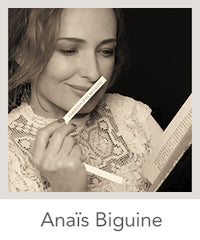Anaïs Biguine: Interpreting Oscar Wilde in Scent
Fans of niche perfume often are fans of literature and great writing. Maybe we’re quick to recognize the stories that perfumes can tell and to cast them as characters in our own stories.
 Whatever the reason, we especially love it when the worlds of perfume and literature collide. And that’s the entire basis of Jardins d’Écrivains, a line created by Anaïs Biguine, a French lover of literature. Every perfume she releases is inspired by a famous writer or literary character. Gigi, from the Olfactif In the Summer Garden collection—was inspired by Colette’s titular character. George was inspired by the writer George Sand. Junky, her newest release, was inspired by the William S. Burroughs novel of the same name.
Whatever the reason, we especially love it when the worlds of perfume and literature collide. And that’s the entire basis of Jardins d’Écrivains, a line created by Anaïs Biguine, a French lover of literature. Every perfume she releases is inspired by a famous writer or literary character. Gigi, from the Olfactif In the Summer Garden collection—was inspired by Colette’s titular character. George was inspired by the writer George Sand. Junky, her newest release, was inspired by the William S. Burroughs novel of the same name.
One of our favorite Jardins d’Écrivains scents happens to be inspired by one of our favorite writers: Wilde, inspired by Oscar Wilde. The man was born in 1854 and died in 1900, producing most of his best work toward the end of his life. But even today, he remains a totally modern figure. (This is the man who once said, “The play was a great success but the audience was a disaster” and “It is absurd to divide people into good and bad. People are either charming or tedious.”)
Like the man, the scent is classy. Like his writing, the scent is harmonious, witty, and bright. We spoke with Biguine about her love for Oscar Wilde and how she translated his essence into a perfume.
 Olfactif: I’m thrilled to be talking to you about Oscar Wilde, one of my favorite authors. What made you decide to create a perfume inspired by Oscar Wilde?
Olfactif: I’m thrilled to be talking to you about Oscar Wilde, one of my favorite authors. What made you decide to create a perfume inspired by Oscar Wilde?
Anaïs Biguine: It actually started as a dare from my Italian distributor. He pointed out that I had already done La Dame Aux Camelias, George, and Gigi—why not interpret a man for a change? And for me, the ultimate male literary figure is Oscar Wilde. It was so obvious. I dove back into the details of his life, including his final days in Paris. One amusing anecdote: At the end of his life, Wilde was completely broke, and when his doctor expressed some concern about getting paid, Wilde opened one eye and quipped, “I am dying above my means.” And in that hotel room you can still see his unpaid hotel bill.
Wilde, of course, had an astonishing life, and it’s true that the part of his life when he was at his best was in his youth.
O: Before the world broke him.
 AB: Exactly. So I mainly wanted to invoke his youth, without getting too scandalous. I started with a very classic formula. Wilde was a very handsome man, a real dandy, very chic, and of course extremely witty. So I brought together two ideas that for me represent him completely: First, the Bond Street Londonian ideal, with vetiver, bergamot, and carnation, which later became an emblem of the gay community; second, Greek antiquity, which I represented with fig and also raisin, which is rarely used in perfume. You end up with an incredibly fresh juice, and the hard part was finding a way to make this freshness last. Most fresh perfumes are very ephemeral, but I wanted this one to have staying power. We did it, and this is one of the biggest successes among my six perfumes. People who wear Wilde are very loyal to it, which is not how most people approach perfume nowadays. It’s perfectly balanced and very, very classic.
AB: Exactly. So I mainly wanted to invoke his youth, without getting too scandalous. I started with a very classic formula. Wilde was a very handsome man, a real dandy, very chic, and of course extremely witty. So I brought together two ideas that for me represent him completely: First, the Bond Street Londonian ideal, with vetiver, bergamot, and carnation, which later became an emblem of the gay community; second, Greek antiquity, which I represented with fig and also raisin, which is rarely used in perfume. You end up with an incredibly fresh juice, and the hard part was finding a way to make this freshness last. Most fresh perfumes are very ephemeral, but I wanted this one to have staying power. We did it, and this is one of the biggest successes among my six perfumes. People who wear Wilde are very loyal to it, which is not how most people approach perfume nowadays. It’s perfectly balanced and very, very classic.
O: What’s your favorite Oscar Wilde work?
AB: I particularly love his great one-liners and aphorisms on any and all subjects: love, marriage, religion, politics, society, art… What’s most notable about him is his gift for telling profound truths about the human condition in very few words, and with an elegance and wittiness that are all his. For me, it’s more about that than any particular work of his. That being said, Salomé is just insane!
What’s wonderful about Salomé is that he inserts this British humor in an atmosphere straight from Antiquity, and it works so well. Additionally, he wrote this role for his close friend Sarah Bernhardt, and since I love the historical aspect of things, I really get a kick out of going to Pere Lachaise cemetery in Paris and imagining these two friends buried together. They really lived lives that were stranger than fiction.
O: Oscar Wilde seems so contemporary. He lived in the late 19th century but is truly a modern figure.
AB: Very, very modern! I think today we really need his kind of genius, so powerful in youth. Later he married, suffered legal troubles, and was broken, especially at the end of his life. How did a man of such panache, such talent, end up broken like that? Life had really bad surprises in store for him.
Wilde’s grave is the most visited one at Pere Lachaise. He is, of course, very well known, particularly within the gay community. But my idea was not at all to create a fashionable perfume targeted to a gay stereotype. A year and a half after its release, I’ve noticed that it is actually more popular among straight men.
O: What about women who wear Wilde? Do you think they’re making a statement?
AB: It’s very nice for a woman to wear. I love wearing it, especially for summer. This isn’t a stereotypically masculine fragrance nor a feminine one. Women’s fragrances tend to use the same materials over and over, so this is a real departure from that, and it’s very successful.
For example, you rarely find carnation in women’s perfume, but this has carnation. It’s green and fresh, and that’s not all from vetiver, either. The combination of Victorian England against a background of raisin and fig works very well. My perfumers in Grasse were skeptical at first, but it turned out really marvelously. It’s a timeless scent that could have existed forever. It’s the most classic of all my fragrances.
Learn more about Wilde or read a previous Q&A with Biguine. Looking for a fun way to dip your toes into the world of Oscar Wilde? Check out the very funny The Importance of Being Earnest.

Leave a comment
This site is protected by hCaptcha and the hCaptcha Privacy Policy and Terms of Service apply.